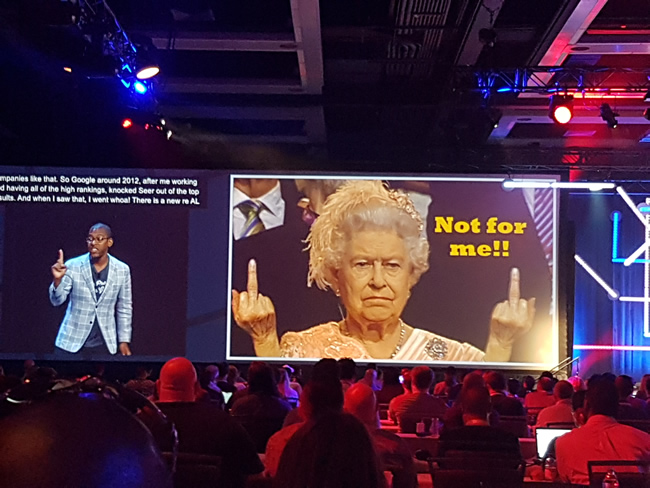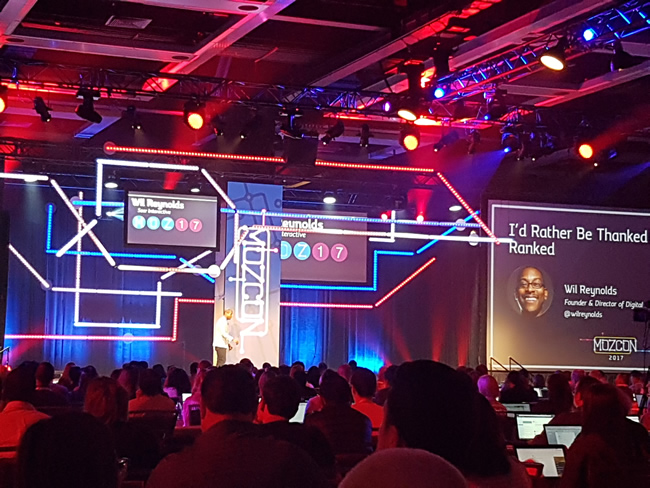DISCLAIMER: This post is written as a live blog from Mozcon. There may be typos and grammar to make my high school English teachers weep. Please excuse those … it’s a fast-paced conference with back-to-back sessions and no time for proofing or even proper writing.
Wil Reynolds opened up day two of Mozcon 2017 with a heartfelt monologue to Rand and for all Rand has done for Seer.
Now he’s started in chatting about how it’s more important to be thanked than ranked – that is, produce the content you want to find not what you want to rank.
He uses the example of his ranking for “seo company”, “seo agency”, etc. and how it brought zero dollars. He then looked at where the queries were coming from and found they were small businesses that weren’t his clients. They he his client list and think …

A couple years later his rankings tanked and his business took off. Why?
Now he’s talking machine learning. Machine learning improved translation via Google Translate more in 24 hours than humans could in a decade.
He then asks us to ask ourselves what would happen if Google can improve to just providing the best answer and would we still rank. Machines are taking over and they will produce these types of results.
Wil took on a client that should have owned a phrase based on history, etc. but didn’t. He convinced them to switch to focusing on providing information, which was what the rankings were monopolised by, and it worked.
Remember – you can’t automate caring but you can automate pretending to.
He pointed out that looking up pricing info for a site they were showing up other sites. That’s because most sites don’t focus on being helpful. Well now Google knows. He points out how Hubspot rates themselves #2 on their comparison page. This builds trust and Google rewards them for it.
Watch people go through search results. It will give you a huge awakening.
Remember – personas aren’t people.
Watching people work with your page will tell you the issues that Google will soon pick up on algorithmically. A 4 minute video that isn’t watched and frustrates the user hurts your business and your rankings.
Now he’s chatting about how it’s important to know your visitors why. “composite deck” is not a “why” but “splinters” is.
So we need to ask what we’re ignoring:
- Why did you click that?
- Why didn’ you click that?
- What would make this better?
- What is it missing?
And we need to create content that solves a problem, that answers the client’s question. Solve a problem dont’ get them in the funnel.
Will hates viral stuff. He likens it to drug highs and lows. Beter to solve a problem than pop up with a spike over a funny dog video.
He Recommends:
Getstat.com – And get the info on what sites are ranking for your terms and target paid ads onto them.
And look at your queries in AdWords and make sure you have the content that matches it or you’re paying for poor conversions and you’re paying a lot for it.
Feedcheck.co – With this mixed with NGram Analyzer you can get into on who has reviews and pull information on what those reviews are indicating in aggregate (i.e. finding common terms in the reviews). You can find positives and use this to adjust your metas to improve clickthroughs and ads.
You can use keyword research to understand your markets. Look up a city from it’s zip code and you’ll start to learn more about the city based on what people look up in the area.
Once you get high rankings the job starts. Now it’s time to improve your content and increase that traffic and now you can start to find out what people are leaving the site to find and you can rank for it. Talk to your customers and find out what they want and where they go to get it.
If you want to solve problems and you’re not willing to send your visitors to a competitor you need to invest in better content.
The advertising that resonates is about the life we want to live not the life we live.
Pro Tip – if you have tools that allow you to collect data you can use this to trigger the adding of the user to an audience and target ads or actions towards them. VERY good idea. (he uses the selection of the number of executive offices on an office rental space guide)
Note to self and you (or reader): Something to look into – event triggers based on the visitor’s actions (which pages they view) and then adjusting bids and ads based on that. Do they visit your personal or business product pages? Do they visit expensive properties or cheap ones on your rental site? I couldn’t get all the data on this but something to look into and hoping to have him on our radio show soon to talk about it further.
You can download his slide deck here.
